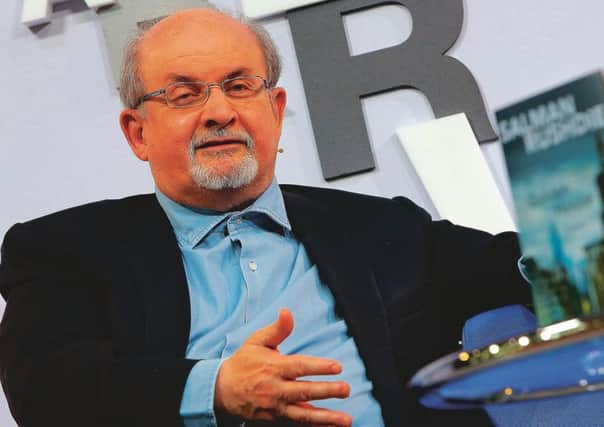Edinburgh Book Festival review: Salman Rushdie | Rory Stewart | Adam Nicolson


On the festival’s final day Salman Rushdie made a case for old stories too, or at least for a new take on the first modern novel, and gave the first-ever public reading from Quichotte. (By the way, it’s pronounced Key-Shot, although apparently Cervantes would have insisted on Don Key-Shotty: anything but Donkey-hoty).
It is, he told chair Jim Naughtie, “quite a weird book,” and judging by the precis – a failed spy writer is trying to connect with his son after dreaming up a novel about a retired Indian-American pharma salesman called Quichotte, whose mind has been scrambled by watching too much TV and who is criss-crossing the country to declare his love to an Oprah-like star – he’s not wrong. At first Rushdie wasn’t sure about twisting the two stories inside each other, “but as I went on, they started talking to each other.” Encouragingly, his agent thought it the funniest thing he’d ever written.
Advertisement
Hide AdEssentially, he said, the novel is a road trip - a classic American genre and one flexible enough to turn in any direction he wanted. Because it was criss-crossing the red states of You-Know-Who’s America (Trump is unnamed in the novel because “I don’t f***ing want him in it”), that direction would be to satirise a paranoid, opioid-riddled, corrupt culture. An America that felt lonely, isolated, and lied to, that was so shocked by the election of Obama that it doubled down on its inherent racism. Remember the optimism at the end of The Adventures of Augie March, he said, quoting whole chunks of it (“Look at me, going everywhere! Why, I am a sort of Columbus of those near-at-hand”)? Well, Quichotte is its complete opposite.
For all his gloomsterism (as our own You-Know-Who would doubtless call it), Rushdie is even more pessimistic about India and Britain. At least Trumpism is reversible next year. Brexit (“the biggest historical mistake I’ve ever seen any country make”) isn’t.
Rory Stewart, who preceded Rushdie in the main tent, would have agreed. He sounded, if not disillusioned, then at least questioning whether his kind of politics - compromise, mastering messy detail, practical reform – is still relevant. These days, he said, all we seem to want is heroism, dreams, Churchillian fantasies, lines in the sand and billowing optimism. The question “how” has, he added, disappeared from our political lexicon, and not just over Brexit. He’d been in Glasgow earlier that day, and been shown a syringe-strewn heroin “shooting gallery” in Saltmarket. The “how” of solving questions like why twice as many English addicts than Scots were in treatment programmes was what engaged him in politics. In practice, he accepted, voting against no-deal Brexit would make many of his fellow Tories look on him as a “traitor” for at least five years, so “trying to be the next PM might not be the most useful thing I could do with my time.” Pity, that.
Talking about drugs brings me straight to Adam Nicolson, who in an engrossing event with artist Tom Hammock, explained why the year William and Dorothy Wordsworth spent with Coleridge in Somerset in 1797 led to some of the most remarkable poetry in the language. Nicolson briefly went to live there too, to get inside the poets’ minds. Referring to “Kubla Khan,” chair Magnus Linklater asked if this included taking opium. “Of course,” said Nicholson. “But as many of you will know, it’s not a hallucinogenic or psychedelic drug. It’s a very mattress-y, an opiate of a floating, drifting softness.” The grey-haired audience nodded sagely, as if this was hardly a new story to any of them. David Robinson